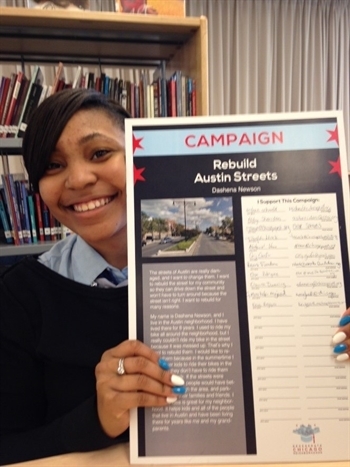
Photo: Helen Slade, www.territoryap.org
Territory participants set up shop on Argyle Street in Uptown.
There’s been an uptick in interest in teaching students how to proactively engage with their own neighborhoods and develop strategies to improve them. As a parent, urban planner and former teacher, I’ve often wondered how today’s students will plan for their neighborhoods and communities 10 years from now. Programs like Regenerate Chicago’s Neighborhoods and Territory are working to answer that question and help students address the issue of “Why should I get involved when no one will take me seriously?” These groups are equipping students with the tools to make their voices heard by promoting ideas that lead to healthier, safer and stronger communities.
Through our work on Placemaking, Corridor Development Initiative and Great Rivers Chicago, staff at MPC spend a great deal of time helping communities proactively plan for the future. While we deploy an array of tools to make it possible to community members to participate—from text polling to public meetings—it is rare to see teenagers engaged in these processes. Regenerate Chicago’s Neighborhoods and Territory are equipping teens with tools to share their ideas, giving them confidence to participate in these conversations, too.
At an open house on Wednesday, March 18, students at CICS ChicagoQuest: Minds on a Mission High School presented their ideas for ways to improve their neighborhoods. The teens I spoke with overwhelmingly ranked better-quality, safe and active places to go in their neighborhoods above major capital-intensive investment. Dashena wants to see streets in her Austin neighborhood striped with bike lanes to make it safer to ride; Mayda thinks teens need to learn more about the impact of dropping trash on the streets and sidewalks, and proposes an education campaign at Welles Park in the Lincoln Square neighborhood where she lives. Kierre wants to reorganize the park in his Uptown neighborhood by moving the playlot away from the train tracks and providing better programs.

Dashena proposes bike lanes in her Austin neighborhood.
In other parts of Chicago, students are also committing to extracurricular programs aimed to improve civic engagement. Last summer high school and college students worked with Territory to develop ideas for improving the stretch of Argyle Street between Broadway and Sheridan roads in Uptown. The group was invited by 48th Ward Alderman Harry Osterman to use the ward’s satellite office for the summer, where they mapped their surroundings, talked with neighbors and passers-by and developed proposals for improving the area. This stretch of Argyle will become a shared street later this year.
Particularly since 2012, we’ve learned to do more with less. We continue to seek opportunities to improve programming or make small changes that have big impact, rather than seeking the capital-intensive, pie in the sky alternative. Teenagers seem to get that. They have good ideas. We need to be sure we listen to them.